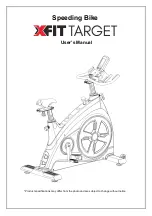
12
1
Locate the two pieces of adapter tubing.
Figure 20
Adapter Tubing
2
Route the adapter tubing through the “tunnel” under the autosampler head,
with the smaller end facing the peristaltic pump and the larger end facing the
rinse station.
3
Connect the tubing to the bottom two connectors of the rinse station.
4
Connect the tubing to the fittings at the bottom of the pump.
5
Use an
appropriate length of the smaller ⅛ inch (3.2 mm) ID tubing to connect
the rinse solution source(s) to the fittings at the top of the pump.
6
Connect two pieces of
3
/
16
inch (4.8 mm) ID drain tubing to the upper
connectors of the rinse station.
Ensure that the tubing outlet is placed so that it will remain above the surface
of the liquid in the waste container. If the end of the tube is immersed, the
waste solution might back up and overflow.
7
Once the autosampler has been set up and connected to a computer, use the
ASX Dashboard software to enable the dual-rinse option and set the pump flow
rate to at least 30 mL/min.


































